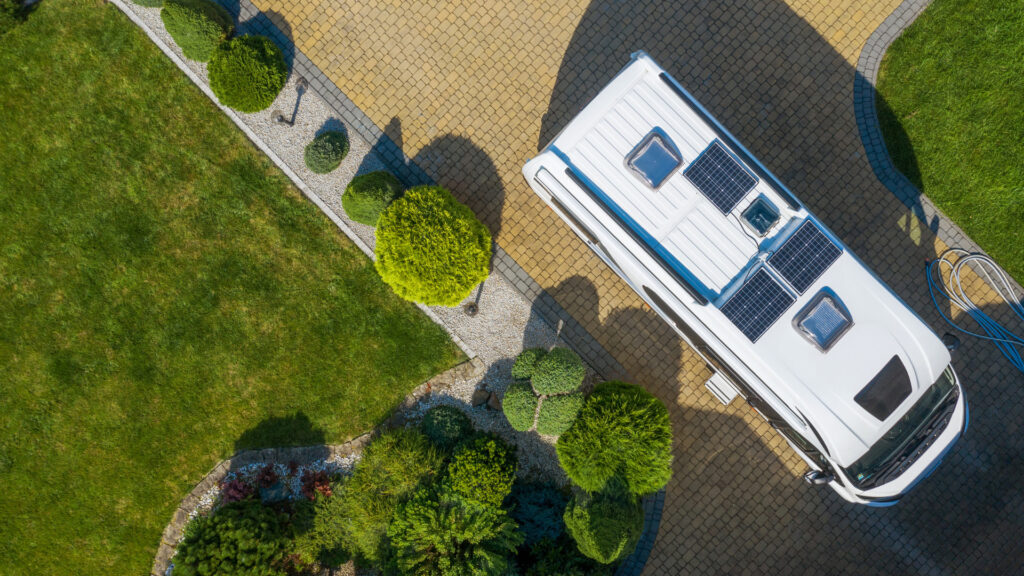Table of Contents Show
You’re looking at getting a new fifth wheel to start making memories with your family. Maybe you want a camper van to hit the road on the weekends.
Or perhaps you’ve just retired and your dream to own a Class A motorhome is finally coming true. Whatever your reason for owning an RV, you’ll need an indoor RV storage space to store it when it’s not in use.
Let’s take a look at why indoor RV storage is the best option if you can afford it and if you have a location near you.
Do RVs Need to Be Stored Inside?
When not in use, RVs are usually stored at someone’s house or in a storage facility. Some people have a large driveway to park their RV for a few months. Others have a side yard with a covered garage. But many people don’t have the room to be able to store their RVs at their homes.
They turn to storage facilities in the community. Sometimes campgrounds offer storage. Other places like self-storage facilities have space for a few RVs. But most of these locations only offer outdoor storage. Indoor storage options are much harder to find.
So do RVs need to be stored inside? No, they don’t have to be. There may not be an indoor storage option within hours of your residence.
But if you can find a location and have the money to pay the high monthly rent, indoor RV storage is certainly better than outdoor RV storage. Let’s take a look at why.
What Is Considered Indoor RV Storage?
First, outdoor RV storage is simply parking your rig outside. This might be your driveway or yard, a field at a campground, or underneath a covered carport at a storage facility. Your RV is left here for the months it’s not in use.
In contrast, indoor RV storage is similar to a garage. These storage units vary from 10 feet by 20 feet to 10 feet by 40 feet to even larger options for motorhomes and long trailers.
You drive your RV into the garage unit and close the door until you’re ready to get it back out in the spring.
Pros of Indoor RV Storage
Because of cost and location, indoor RV storage isn’t viable for some people. However, there are huge advantages to storing your RV in a protected location.
From security to weather protection to pest protection, these units provide far better sanctuaries for your RV when it’s not in use.
Protection from Weather and Debris
When you store your RV outside, even with a cover, it’s still prone to the weather. Going from below freezing to above freezing during the winter can damage different components. Snowfall on a roof can cause structural damage.
Additionally, humidity is one of the worst enemies of RVs. This moisture can wreak havoc on an RV’s interior.
When you store your RV indoors, you protect it from these weather conditions. In addition, you protect it from falling branches or other debris from thunderstorms, wind storms, or blizzards. You won’t find hail damage to your RV when you get it out in the spring.
Climate Controlled Space
As mentioned above, humidity can cause mold to grow inside the walls and underneath mattresses in an RV. This can be extremely hazardous to your health. Plus, it’s very costly to get rid of.
In addition, extreme temperatures in the summer can cause seals to crack. A climate-controlled space will keep the temperature and humidity at appropriate levels.
That’s why you don’t have to worry about walking into a danger zone or money pit once the spring season arrives.

More Secure Facility
If your RV is stored indoors, no one can see it. This prevents theft.
Although outdoor storage facilities may have a fence, gate, and cameras, your RV is a sitting duck. When it’s safe in a garage, someone has a much lower chance of breaking into it.
UV Ray Protection
Like humidity, the sun can wreak havoc on an RV. UV rays can damage your roof, fade graphics and paint, and degrade the interior furniture. You paid a lot for your RV and want it to look beautiful when you get it back out of storage.
But you also don’t want to repair a roof the week after you get it out. Putting it in an indoor RV storage garage will protect it from the sun’s harmful rays.
Reduces Tire Damage
Varying temperatures can cause premature damage to your tires. You can’t control whether or not the temperature drops into the teens one night and gets above 60 degrees two days later.
The constant freezing and thawing during the winter can damage your tires’ structure and shorten their lifespan. RV tires aren’t cheap.

Protection from Pests and Rodents
Finally, if you store your RV outdoors, there’s always a chance that rodents will make their way inside. Even with all the proper precautions, there’s no guarantee you won’t come back to droppings in your kitchen or holes in your underbelly.
Indoor RV storage protects your RV from such pests. Again, you paid a lot for your rig. You don’t want it taken over by rodents.
Keep in Mind: Keep Mice Out of Your Camper For Good with these tips and tricks!
Cons of Indoor RV Storage
So why would anyone park their RV outside with so many advantages to storing it at an indoor facility? There are two reasons: cost and location. Although there are perks to indoor RV storage, it’s just not feasible for some RV owners.
More Expensive Than Outdoor Storage
Owning an RV is expensive. Another budget item is storage. Open-field storage at a campground will cost much less than indoor RV storage at a secured location.
Storing your RV in your driveway at your house is free. Monthly rental rates for indoor RV storage vary tremendously based on the city, the size of the unit, and the length of the contract.
Owners can pay anywhere from $100 $400 per month for indoor RV storage. This just isn’t an option for some people.
Less Facilities Nationwide
Indoor RV storage facilities are also fewer in number than outdoor options. Due to city ordinances or HOA rules, you may not be able to store your RV at your house.
But you can probably find a campground or self-storage facility that offers RV parking for months at a time. You might even have a friend who will let you store your RV on his property.
But finding an indoor RV storage facility is much harder. There may not be an option within hours of your residence. If that’s the case, you don’t have a choice but to store your RV outside where you can.
How Much Does Indoor RV Storage Cost?
As mentioned earlier, indoor RV storage varies. If you’re storing a 40-foot Class A motorhome, you’ll need a larger unit than someone storing a 25ft trailer.
The cost of living in cities across the country also varies. The same 10×40 unit in San Antonio may cost twice as much as a 10×40 unit in Memphis. So expect to pay anywhere from $100-400 per month.

Where Can You Find Indoor RV Storage?
ExtraSpace Storage, Storage.com, and SpareFoot all offer a search feature for indoor RV storage facilities. Make sure to check with your insurance company about coverage when your RV is stored away. Hopefully, nothing will happen, but you want to be covered to be safe.
Another great way to find indoor RV storage is to ask around. Getting personal recommendations and checking Google reviews is important when protecting your RV. Remember, you’ve spent a lot of money already.
Keep in Mind: So how much does it actually cost to store an RV? Let’s take a look!
Is Indoor RV Storage Really Worth It?
If you can afford the monthly rate and have a location near your residence, there’s no reason to store your RV outdoors. Indoor RV storage is a much better option.
Your RV will have a much longer lifespan because it will be better protected. You won’t have concerns about what you’re walking into when the fall arrives.
Did the summer heat ruin your paint? Did the hailstorm last week damage your roof? None of these problems will happen with your RV stored away indoors.
Is an indoor RV storage facility the best option for you?






